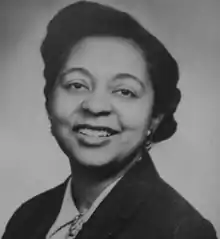Ruth Wright Hayre
Ruth Wright Hayre (October 26, 1910 – January 30, 1998) was an American educator in Philadelphia public schools. She was the first African American to teach full-time in the district and work as principal of a high school. Hayre also became the first female president of the Philadelphia Board of Education.
Ruth Wright Hayre | |
|---|---|
 Hayre, c. 1956 | |
| Born | October 26, 1910 |
| Died | January 30, 1998 (aged 87) |
| Known for | American educator, "tell them we are rising" program |
Early life
Hayre's grandfather was Richard R. Wright.[1] Wright was both founder and president of Georgia State College, and other members of her extended family were well-educated.[2] She was born on October 26, 1910,[3] in Atlanta, Georgia,[2] to Charlotte Crogman Wright and Richard R. Wright Jr.[4] Her family, in the upper middle class,[4] soon moved to West Philadelphia.[5]
Hayre attended schools in the city that were mainly attended by white children[4] and graduated with honors[2] from West Philadelphia High School for Girls when she was fifteen. Around five years later, in 1930 or 1931, she graduated from the University of Pennsylvania with a master's degree in education.[2][4][6] Hayre had attended Pennsylvania on a scholarship.[2]
Teaching career
She was initially unable to find employment in Philadelphia schools and was forced to move to Arkansas and begin teaching there, first at Arkansas State College for Negros.[1][2][6] In 1933 Hayre moved to Dayton, Ohio, teaching at Dalton High School. Three years later she moved to Washington, D.C., teaching at the Armstrong Industrial High School.[4] While in D.C. she married Talmadge Hayre in 1937.[3]
The couple moved back to Philadelphia two years later when her husband was hired at Cheyney State College.[2] Hayre earned a PhD at Pennsylvania (1949) and was hired to teach at Sulzberger Junior High School in Philadelphia. At the time she was the second Black employee in the district. In 1946 Hayre became the first Black high school teacher in the city when she moved to William Penn High School for Girls. She was made vice principal in 1952 or 1953 and principal several years later, making her the first African American principal in the city. At the school, Hayre co-created "WINGS", a program aimed at "encouraging students to discover their talents" according to the African American National Biography.[2][4][7][8]
In 1963 Hayre was again promoted, this time to supervise a district of the cities educational system. While she led the district, Hayre worked to upgrade its facilities and advocate for "more inclusion of black history". She retired from teaching in 1976 or 1978. On December 2, 1983, she joined the Philadelphia Board of Education, holding the position of president in 1991 and 1992, making her the first woman to be president. Hayre helped the board respond to the AIDS epidemic, increasing sex education and instituting the distribution of condoms.[2][4][7]
Retirement and death
In 1988,[4] Hayre created a program providing funding for the education of 116 or 119 Black children.[1][4] The program was named "Tell Them We Are Rising" after a line in "Howard at Atlanta", a John Greenleaf Whittier poem, that was based on Hayre's father's life. It offered to fund the college education of the selected children if they stayed in school and got into college[2][5] and provided for tutoring and other programs of mentorship. The year after she announced the program, the University of Pennsylvania granted Hayre an honorary LLD.[3] In 1997 she published Tell Them We Are Rising, an autobiographical memoir that was co-written with Alexis Moore Bruton.[9] The program resulted in sixty students graduating from high school, thirty-nine attending either two or four-year colleges, and twelve entering technical schools. Temple University later studied the program and determined that the program had increased the numbers of students on an honor roll and decreased dropouts.[2] She died on January 30, 1998.[5]
A mural in her memory was unveiled in 2018 in a Philadelphia elementary school.[6] The Ruth Wright Hayre scholarship was created in her memory.[4]
References
- Gilbert, Fletcher (February 1998). "Contrasting lives and singular vision: Two African-American women, Miss Oseola McCarty and Dr. Ruth W. Hayre". Black Collegian. 28.
- "Hayre, Ruth Wright". Oxford African American Studies Center. doi:10.1093/acref/9780195301731.013.37046. Retrieved 2021-01-30.
- "Temple University Libraries | Ruth Wright Hayre Collection". library.temple.edu. Retrieved 2021-01-24.
- Smith, Jessie Carney (1992). Notable Black American Women. VNR AG. pp. 279–282. ISBN 978-0-8103-9177-2.
- "Philanthropy". Black Women in America (2 ed.). Oxford University Press. 2005-01-01. doi:10.1093/acref/9780195156775.001.0001. ISBN 978-0-19-515677-5.
- Graham, Kirsten A. (September 30, 2018). "Portrait of a trailblazer: An artistic remembrance for educator Ruth Wright Hayre". Philadelphia Daily News.
- "Ruth Wright Hayre: 1910-1998". The Philadelphia Tribune. March 15, 2009.
- Delmont, Matthew (May 2010). "The Plight of the "Able Student": Ruth Wright Hayre and the Struggle for Equality in Philadelphia's Black High Schools, 1955–1965". History of Education Quarterly. 50 (2): 204–230. doi:10.1111/j.1748-5959.2010.00260.x. ISSN 0018-2680.
- Jones, Rachel (April 6, 1997). "BOOK REVIEW: An Educator in a Class by Herself". The Washington Post.
Further reading
- Thompson, Darlene A. (1990). The sociopolitical context of the Philadelphia Public Schools 1912 to 1972: Viewed in retrospect by Ruth Wright Hayre (PhD thesis). Temple University.